By Leen Randell
Updated: Jul 04, 2024
10 Best Herbal Decoctions For Knee Pain
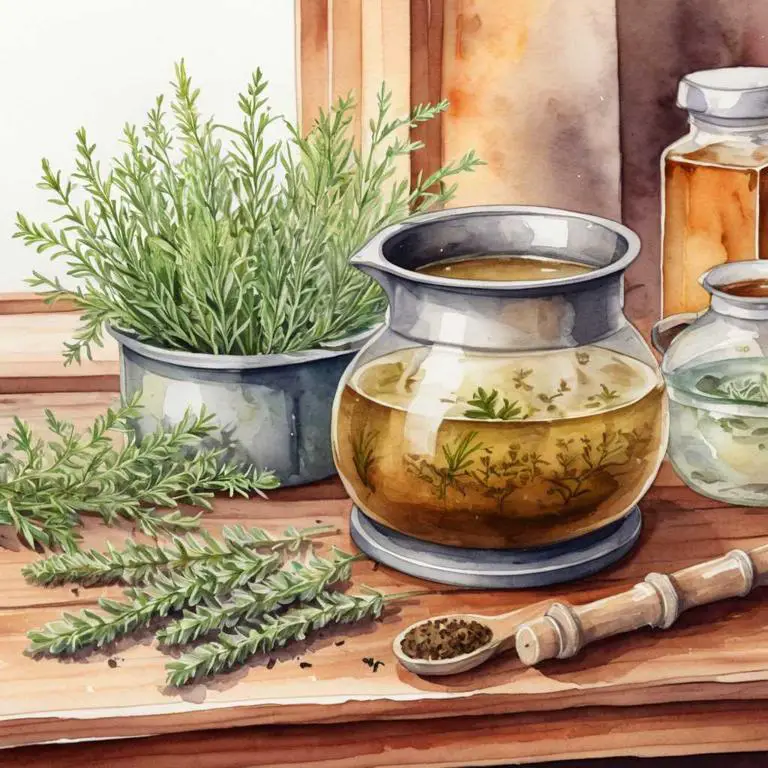
Herbal decoctions for knee pain are a natural remedy that has been used for centuries to alleviate discomfort, stiffness, and inflammation associated with knee pain.
These decoctions work by reducing swelling, relaxing muscles, and promoting circulation, which helps to improve mobility and reduce pain. Examples of herbal decoctions that help with knee pain include turmeric, ginger, and willow bark tea.
For instance, a person with knee osteoarthritis can enjoy a warm cup of turmeric tea before bed, which helps to reduce morning stiffness and improve joint flexibility, allowing them to engage in daily activities without discomfort.
The following article describes in detail the most important decoctions for knee pain, including medicinal properties, parts of herbs to use, and recipes for preparations.
- 1. Glycyrrhiza glabra
- 2. Capsicum annuum
- 3. Curcuma longa
- 4. Artemisia absinthium
- 5. Cymbopogon citratus
- 6. Althaea officinalis
- 7. Zingiber officinale
- 8. Rheum rhaponticum
- 9. Echinacea angustifolia
- 10. Piper nigrum
- What is the best combination of herbal decoctions to use for knee pain?
- What ailments similar to knee pain are treated with herbal decoctions?
1. Glycyrrhiza glabra
Licorice decoctions helps with knee pain because of its anti-inflammatory properties, which reduce swelling and alleviate discomfort in the joint.
The natural compounds found in licorice root, such as glycyrrhizin and flavonoids, have been shown to inhibit the production of pro-inflammatory enzymes, thereby decreasing inflammation and pain in the knees.
Additionally, licorice decoctions may help improve joint lubrication and reduce cartilage degeneration, further contributing to its analgesic effects on knee joints.

Medicinal Constituents
The list below shows the primary medicinal constituents in Glycyrrhiza glabra decoctions that help with knee pain.
- Glycyrrhizin: A triterpenoid saponin that helps alleviate knee pain by reducing inflammation and inhibiting the production of pro-inflammatory enzymes, such as COX-2.
- Licoricidin: A phenolic compound that exhibits anti-inflammatory and antioxidant properties, which can help reduce pain and swelling in the knee joint.
- Licopyranocoumarin: A phenolic compound that has been shown to inhibit the production of inflammatory mediators, such as prostaglandins and leukotrienes, which contribute to knee pain and inflammation.
Parts Used
The list below shows the primary parts of licorice used to make decoctions for knee pain.
- Roots: Used for knee pain decoctions due to their high content of glycyrrhizin, which has anti-inflammatory properties.
- Barks: Utilized for knee pain due to their flavonoid content, which may help reduce inflammation and alleviate pain.
- Leaves: Employed in knee pain decoctions due to their rich antioxidant profile, which can help alleviate pain and reduce inflammation.
Quick Recipe
The following recipe gives a procedure to make a basic licorice for knee pain.
- Gather 30g of dried roots of glycyrrhiza glabra and clean them thoroughly with filtered water.
- Crush the roots into a fine powder using a mortar and pestle to increase surface area.
- Combine the powdered root with 500ml of boiling water in a heat-resistant glass container.
- Steep the mixture for 10-15 minutes to allow the active compounds to infuse into the water.
- Strain the decoction through a cheesecloth or a fine-mesh sieve into a clean container.
2. Capsicum annuum
Bell pepper decoctions helps with knee pain because they contain a rich source of antioxidants, anti-inflammatory compounds, and vitamins that help alleviate inflammation and stiffness in the joints.
The decoction's flavonoids and carotenoids work together to reduce oxidative stress and promote the body's natural healing process. Additionally, bell peppers' high water content makes them an excellent natural lubricant for joints, reducing friction and discomfort.
As a result, regular consumption of herbal bell pepper decoctions may provide long-term relief from knee pain and improve overall joint health.
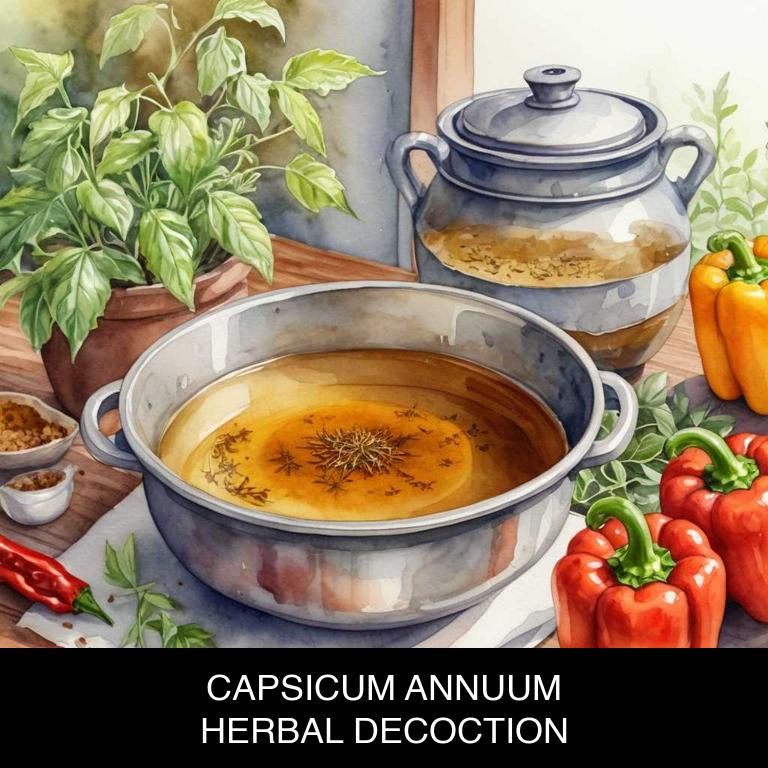
Medicinal Constituents
The list below shows the primary medicinal constituents in Capsicum annuum decoctions that help with knee pain.
- Capsaicin: Capsaicin helps with knee pain by inhibiting the production of a chemical called substance P, which transmits pain signals to the brain, thereby reducing pain perception.
- Beta-carotene: Beta-carotene helps with knee pain by reducing oxidative stress and inflammation in the body, which can contribute to joint pain and damage.
- Quercetin: Quercetin helps with knee pain by reducing inflammation and pain through its antioxidant and anti-inflammatory properties, which can help to reduce joint swelling and pain.
Parts Used
The list below shows the primary parts of bell pepper used to make decoctions for knee pain.
- Fruits: The fruits of Capsicum annuum, specifically the dried and powdered form known as cayenne pepper, are commonly used due to their high capsaicin content, which has anti-inflammatory properties.
- Leaves: Capsicum annuum leaves are often used in decoctions for knee pain relief, possibly due to their antioxidant and anti-inflammatory properties, although specific studies are needed for confirmation.
- Seeds: Capsicum annuum seeds may be used in decoctions for knee pain, possibly due to their potential anti-inflammatory and antioxidant effects, but more research is required to confirm their efficacy.
Quick Recipe
The following recipe gives a procedure to make a basic bell pepper for knee pain.
- Harvest 20-30 grams of fresh capsicum annuum fruits at the peak ripeness stage.
- Clean the fruits thoroughly with lukewarm water to remove dirt and debris.
- Chop the fruits into small pieces and add 1 liter of boiling water.
- Allow the mixture to simmer for 10-15 minutes to release the bioactive compounds.
- Strain the decoction through a cheesecloth or a fine mesh to obtain the clear liquid.
3. Curcuma longa
Turmeric decoctions helps with knee pain because of its potent anti-inflammatory properties, which reduce swelling and stiffness in the joints.
The curcumin present in turmeric decoctions works by inhibiting enzymes that cause inflammation, thus minimizing the discomfort associated with knee pain. Additionally, turmeric's natural antioxidant properties help to soothe and calm irritated joint tissues, promoting faster healing and reducing the risk of chronic pain.
Regular consumption of turmeric decoctions can lead to significant improvements in knee mobility and overall quality of life for individuals suffering from knee pain.
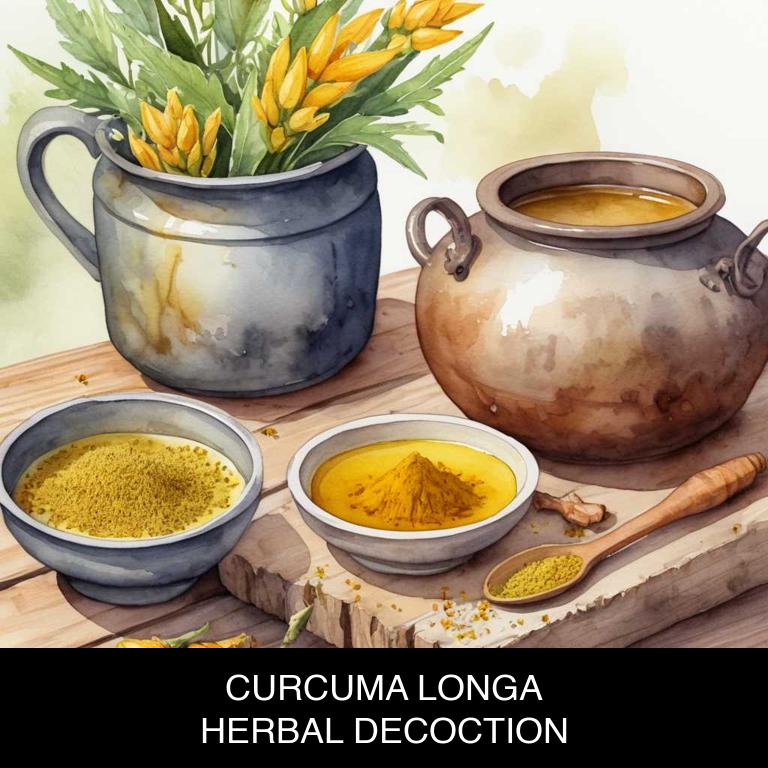
Medicinal Constituents
The list below shows the primary medicinal constituents in Curcuma longa decoctions that help with knee pain.
- Curcumin: It helps with knee pain by inhibiting the production of pro-inflammatory enzymes and cytokines, thereby reducing inflammation and pain associated with conditions like osteoarthritis.
- Demethoxycurcumin: It possesses potent anti-inflammatory and antioxidant properties, which contribute to its analgesic and anti-arthritic effects, helping to alleviate knee pain and inflammation.
- Curcumenol: It exhibits anti-inflammatory and antioxidant activities, which may help reduce pain and discomfort associated with knee osteoarthritis by inhibiting the production of pro-inflammatory mediators.
Parts Used
The list below shows the primary parts of turmeric used to make decoctions for knee pain.
- Rhyzomes: Rich in curcumin, a potent anti-inflammatory compound that helps reduce knee pain and inflammation.
- Roots: Contain bioactive compounds that help to reduce joint pain and swelling, making them a common ingredient in knee pain remedies.
- Barks: Used in traditional medicine to reduce pain and inflammation, as well as to promote healing and reduce joint stiffness.
Quick Recipe
The following recipe gives a procedure to make a basic turmeric for knee pain.
- Weigh 1 tablespoon of dried curcuma longa root and add it to a pot.
- Pour 2 cups of water over the root and bring to a boil.
- Reduce heat and simmer for 10 to 15 minutes.
- Strain the liquid through a cheesecloth or fine-mesh sieve into a cup.
- Drink the warm decoction immediately or let it cool to room temperature.
4. Artemisia absinthium
Wormwood decoctions helps with knee pain because of its unique ability to reduce inflammation and relax muscles.
The bitter compounds present in wormwood, such as absinthin and artequinic acid, have anti-inflammatory properties that help alleviate the swelling and stiffness associated with knee pain. Additionally, wormwood's sedative effects can calm the nervous system, reducing muscle spasms and discomfort.
This natural combination of benefits makes wormwood decoctions a popular remedy for knee pain relief, offering a gentle and effective alternative to pharmaceuticals.
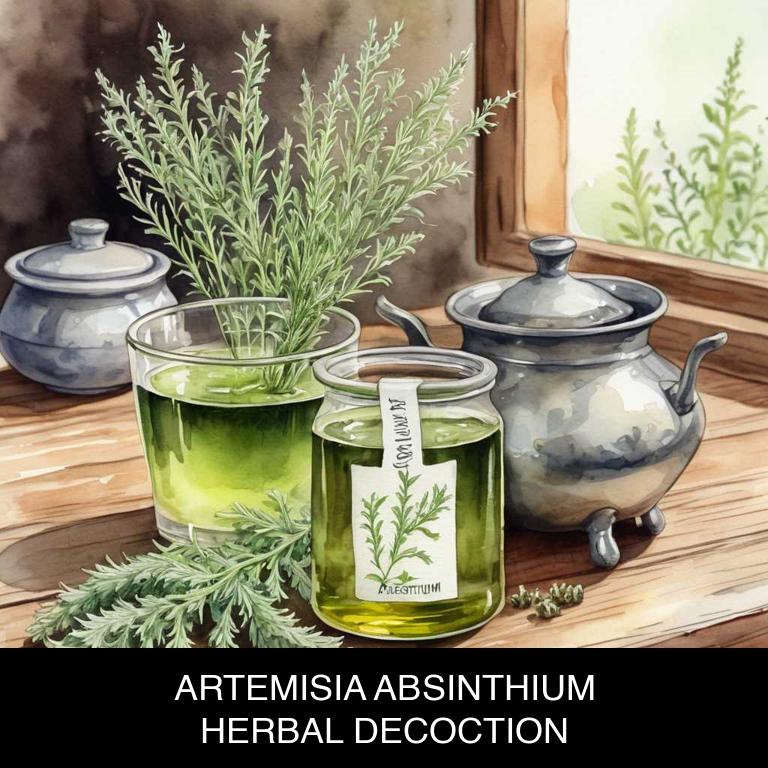
Medicinal Constituents
The list below shows the primary medicinal constituents in Artemisia absinthium decoctions that help with knee pain.
- Thujone: Acts as an anti-inflammatory agent, reducing swelling and pain in the knee joints by inhibiting the production of pro-inflammatory enzymes.
- Bornyl acetate: Exhibits analgesic and anti-inflammatory properties, helping to alleviate pain and discomfort in the knee joints by blocking the action of pain-causing chemicals.
- Abamectin: Shows potential as an anti-inflammatory and pain-relieving compound, likely due to its ability to reduce inflammation and modulate the pain-signaling pathways in the body.
Parts Used
The list below shows the primary parts of wormwood used to make decoctions for knee pain.
- Leaves: Artemisia absinthium leaves are commonly used due to their high concentration of essential oils, including thujone, which has anti-inflammatory properties.
- Stems: Artemisia absinthium stems are often used for their bitter compounds, which may help reduce pain and inflammation in the knees.
- Roots: Artemisia absinthium roots are sometimes used for their resinous properties, which may help soothe and reduce pain in the knee joints.
Quick Recipe
The following recipe gives a procedure to make a basic wormwood for knee pain.
- Harvest 30g of fresh or 10g of dried artemisia absinthium leaves and flowers in the morning.
- Chop the herb into small pieces using sharp scissors or a knife to release its oils.
- Combine the chopped herb with 500ml of boiling water in a heat-resistant glass or ceramic container.
- Steep the mixture for 5-10 minutes to allow the flavors and oils to infuse into the water.
- Strain the decoction using a cheesecloth or a fine-mesh sieve to remove the solids.
5. Cymbopogon citratus
Lemongrass decoctions helps with knee pain because of its anti-inflammatory properties, which help to reduce swelling and ease stiffness in the joints.
The citral and geraniol compounds present in lemongrass have been shown to have a potent analgesic effect, providing relief from chronic knee pain caused by arthritis or injury.
Additionally, lemongrass decoctions can also improve circulation and reduce inflammation in the affected area, allowing for a more rapid recovery and reduced discomfort.
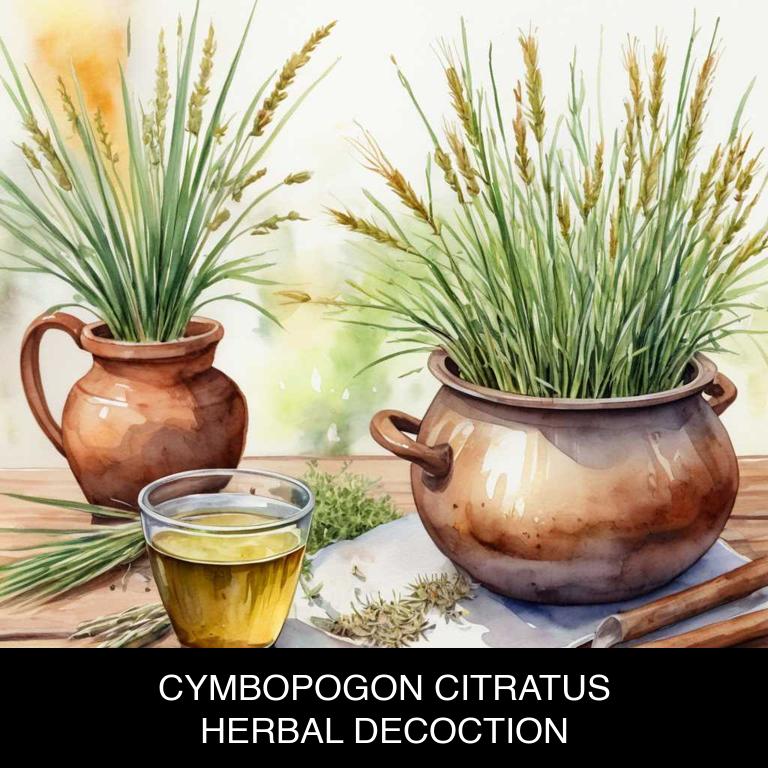
Medicinal Constituents
The list below shows the primary medicinal constituents in Cymbopogon citratus decoctions that help with knee pain.
- Citrals: Citrals, specifically citral and geranial, possess anti-inflammatory properties that can help reduce pain and inflammation in the knee joint.
- Limonene: Limonene, a terpene found in Cymbopogon citratus, has been shown to exhibit anti-inflammatory and analgesic effects, which may help alleviate knee pain.
- Germacrene: Germacrene, a sesquiterpene, has been reported to possess anti-inflammatory and antioxidant properties, which may contribute to its potential in reducing knee pain and inflammation.
Parts Used
The list below shows the primary parts of lemongrass used to make decoctions for knee pain.
- Leaves: Leaves of Cymbopogon citratus are commonly used due to their high concentration of essential oils, particularly citral, which has anti-inflammatory properties that help reduce knee pain.
- Rhyzomes: Rhyzomes of Cymbopogon citratus are often used as they contain a higher concentration of active compounds than the leaves, providing a more potent analgesic effect to alleviate knee pain.
- Stems: Stems of Cymbopogon citratus are also used due to their rich content of citral and other essential oils, which help to reduce inflammation and relieve knee pain when used in decoctions.
Quick Recipe
The following recipe gives a procedure to make a basic lemongrass for knee pain.
- Gather 25 grams of dried cymbopogon citratus leaves and 1 liter of distilled water for the decoction.
- Crush the dried leaves using a mortar and pestle to increase their surface area for better infusion.
- Combine the crushed cymbopogon citratus leaves with the distilled water in a saucepan and bring to a boil.
- Reduce the heat to a simmer and let the decoction steep for 15 to 30 minutes.
- Strain the decoction through a cheesecloth or a coffee filter into a clean container to remove the solids.
6. Althaea officinalis
Marshmallow decoctions helps with knee pain because they contain mucilage, a soothing gel-like substance that coats the joints and reduces inflammation.
The anti-inflammatory properties of marshmallow roots help to alleviate knee joint pain and stiffness caused by conditions such as osteoarthritis. Additionally, marshmallow's natural lubricating effects can help reduce friction between bones and cartilage, allowing for smoother movement and reduced discomfort.
By incorporating marshmallow decoctions into your daily routine, you may experience relief from chronic knee pain and improved overall mobility.
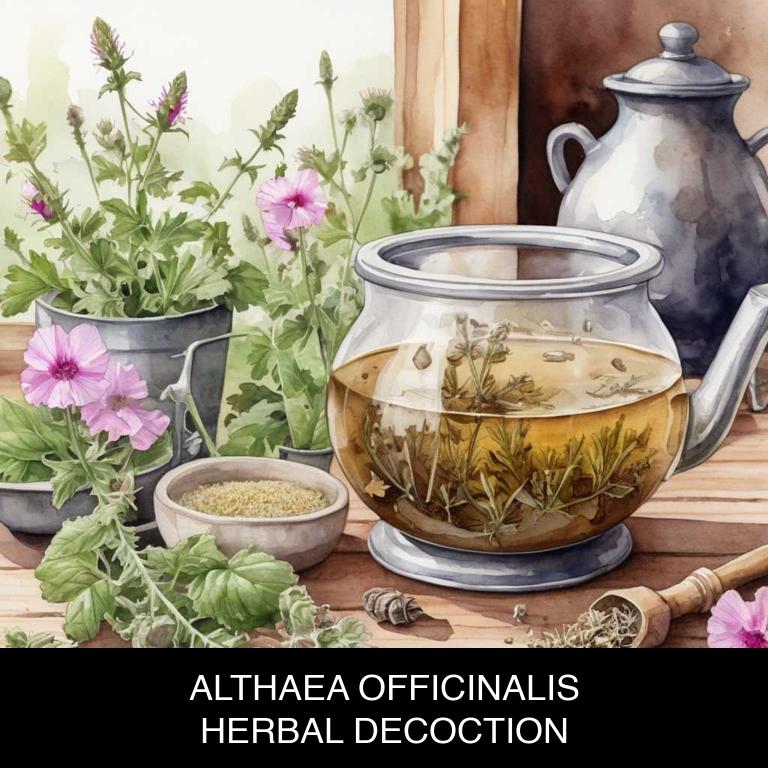
Medicinal Constituents
The list below shows the primary medicinal constituents in Althaea officinalis decoctions that help with knee pain.
- Mucilages: Mucilages in Althaea officinalis help with knee pain by forming a protective barrier on the affected area, reducing inflammation and discomfort caused by arthritis and other knee conditions.
- Gallic acid: Gallic acid, a type of phenolic compound in Althaea officinalis, has anti-inflammatory properties that help alleviate knee pain by reducing swelling and oxidative stress in the affected area.
- Triterpenoid saponins: Triterpenoid saponins in Althaea officinalis have been shown to have anti-inflammatory and anti-arthritic effects, which help alleviate knee pain by reducing inflammation, promoting tissue repair, and improving joint mobility.
Parts Used
The list below shows the primary parts of marshmallow used to make decoctions for knee pain.
- Roots: The roots of Althaea officinalis are rich in mucilage, a soothing compound that helps reduce inflammation and relieve pain.
- Stems: The stems of the plant contain a similar composition to the roots, providing anti-inflammatory and analgesic properties to alleviate knee pain.
- Leaves: The leaves of Althaea officinalis are also known to have anti-inflammatory properties, making them a useful addition to decoctions for knee pain relief.
Quick Recipe
The following recipe gives a procedure to make a basic marshmallow for knee pain.
- Gather 1-2 teaspoons of dried althaea officinalis root from a trusted supplier or harvest it yourself sustainably.
- Measure 1 liter of water in a saucepan and bring it to a rolling boil at 212 degrees fahrenheit.
- Add the dried althaea officinalis root to the boiling water and reduce heat to a simmer for 10-15 minutes.
- Strain the decoction through a cheesecloth or a fine-mesh sieve into a clean container to remove the solids.
- Allow the decoction to cool to room temperature before transferring it to glass bottles for storage.
7. Zingiber officinale
Ginger decoctions helps with knee pain because it has natural anti-inflammatory properties that can help reduce swelling and alleviate discomfort.
The decoction's active compounds, such as gingerols and shogaols, work to block pro-inflammatory enzymes, thereby reducing pain and stiffness in the knee joint.
Additionally, ginger has been shown to improve blood circulation, which helps to nourish and lubricate the joint, further relieving knee pain and improving overall mobility.
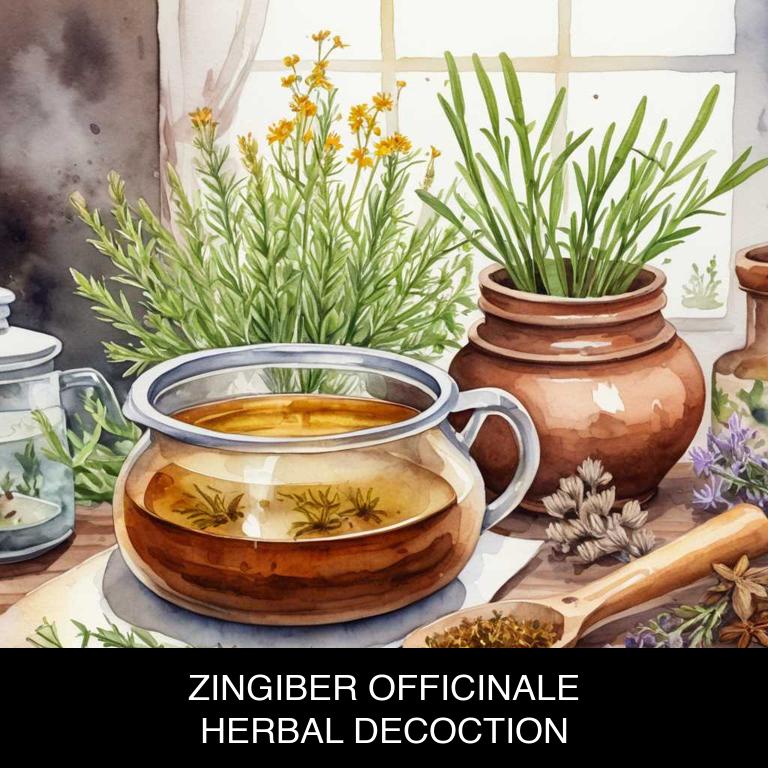
Medicinal Constituents
The list below shows the primary medicinal constituents in Zingiber officinale decoctions that help with knee pain.
- Gingerols: Gingerols, particularly 6-gingerol and 8-gingerol, have anti-inflammatory properties that help reduce pain and inflammation in the knee joint.
- Shogaols: Shogaols, like gingerols, possess anti-inflammatory and analgesic properties, which can help alleviate knee pain by reducing inflammation and blocking pain signals.
- Zingiberene: Zingiberene, a sesquiterpene, has been shown to have anti-inflammatory and antioxidant properties, which can help reduce inflammation and oxidative stress in the knee joint, thereby alleviating pain.
Parts Used
The list below shows the primary parts of ginger used to make decoctions for knee pain.
- Rhyzomes: Rhyzomes are the most commonly used part due to their high concentration of bioactive compounds, including gingerols and shogaols, which have anti-inflammatory and analgesic properties.
- Roots: Roots of Zingiber officinale are also used due to their rich content of gingerols and shogaols, which help to reduce pain and inflammation in the knee.
- Barks: Barks of Zingiber officinale contain compounds like gingerols and shogaols, which have anti-inflammatory and analgesic effects, making them useful for knee pain relief.
Quick Recipe
The following recipe gives a procedure to make a basic ginger for knee pain.
- Gather 1-2 teaspoons of zingiber officinale rhizomes dried or fresh and clean the workspace thoroughly.
- Boil 1 cup of water in a saucepan for 5-7 minutes to reach a rolling boil.
- Add the zingiber officinale rhizomes to the boiling water and reduce the heat to medium.
- Simmer the mixture for 10-15 minutes or until the liquid has reduced slightly and the rhizomes are tender.
- Strain the decoction through a cheesecloth or fine-mesh sieve into a cup and discard the solids.
8. Rheum rhaponticum
Turkey rhubarb decoctions helps with knee pain because they contain anti-inflammatory compounds that reduce joint swelling and alleviate discomfort.
The combination of herbs in the decoction, including turmeric and ginger, also works to relax muscle tension and improve blood flow to the affected area.
This natural remedy can provide relief from stiffness and soreness associated with knee arthritis, making it an effective alternative or complementary approach to traditional treatments for managing knee pain.
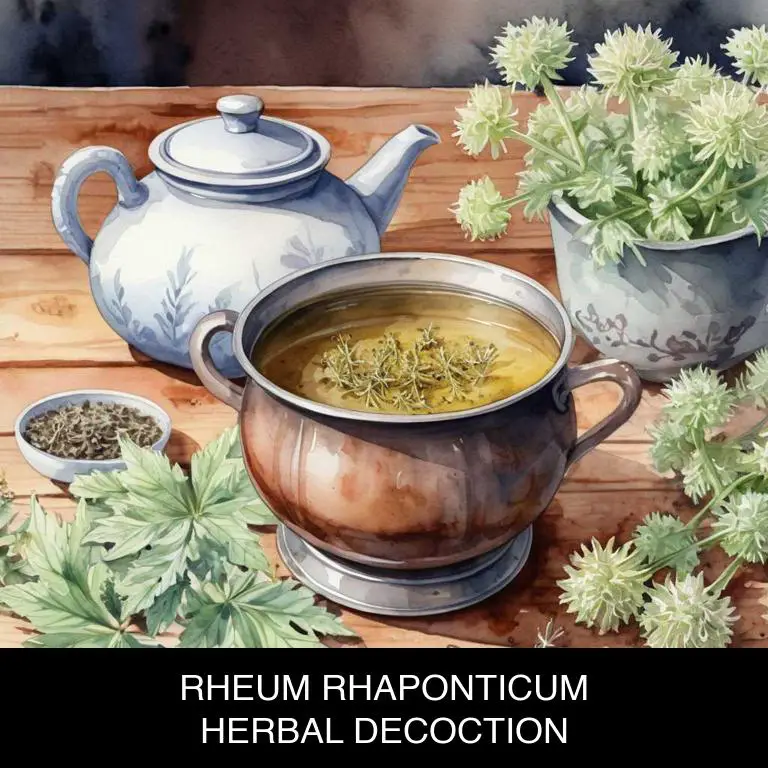
Medicinal Constituents
The list below shows the primary medicinal constituents in Rheum rhaponticum decoctions that help with knee pain.
- Saponins: Saponins in Rheum rhaponticum decoctions help alleviate knee pain by reducing inflammation and suppressing the activity of pro-inflammatory enzymes.
- Rhaponticin: Rhaponticin is a glycosidic compound found in Rheum rhaponticum, and it has been shown to have anti-inflammatory and analgesic properties, contributing to its pain-relieving effects on the knee.
- Anthraquinones: Anthraquinones, a class of compounds present in Rheum rhaponticum, exhibit anti-inflammatory and antioxidant properties, which help mitigate knee pain by reducing oxidative stress and inflammation in the affected joint.
Parts Used
The list below shows the primary parts of turkey rhubarb used to make decoctions for knee pain.
- Roots: The roots are the primary part used due to their high concentration of rhaponticin and other compounds that have anti-inflammatory and analgesic properties.
- Rhyzomes: The rhyzomes are also used due to their similar composition to the roots and their ability to provide a similar therapeutic effect.
- Leaves: The leaves are used as they contain lower amounts of rhaponticin but still have some anti-inflammatory properties, making them a useful alternative or complementary part.
Quick Recipe
The following recipe gives a procedure to make a basic turkey rhubarb for knee pain.
- Harvest 30-60 grams of fresh or 90-180 grams of dried roots of the herb in the summer months.
- Clean the roots by rinsing them with cold water to remove any dirt or debris.
- Chop the cleaned roots into smaller pieces to increase the surface area for infusion.
- Combine the chopped roots with 2-3 liters of water in a large pot and bring to a boil.
- Simmer the decoction for 10-30 minutes or 1-2 hours in a slow cooker.
9. Echinacea angustifolia
Kansas coneflower decoctions helps with knee pain because they possess anti-inflammatory properties that reduce swelling and alleviate discomfort.
The decoction's active compounds, such as kaempferol and quercetin, work to suppress pro-inflammatory enzymes and cytokines, thereby decreasing inflammation in the affected area.
Additionally, the decoction's analgesic effects help to numb the pain, providing relief from stiffness, soreness, and tenderness associated with knee conditions like arthritis, sprains, and strains.
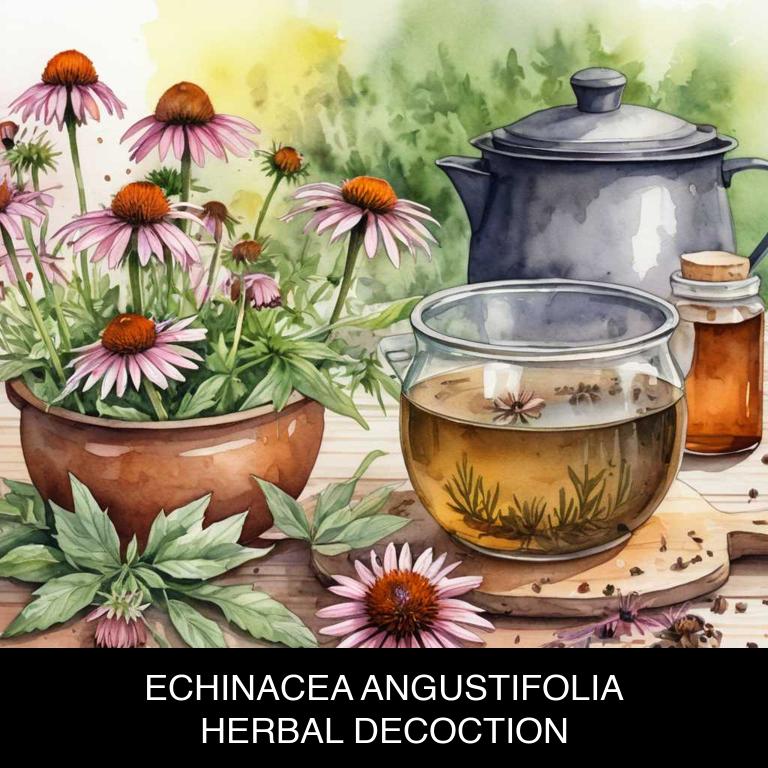
Medicinal Constituents
The list below shows the primary medicinal constituents in Echinacea angustifolia decoctions that help with knee pain.
- Iridoid glycosides: These compounds have anti-inflammatory properties, which can help reduce swelling and pain in the knee joints.
- Flavonoids: Flavonoids in Echinacea angustifolia have antioxidant and anti-inflammatory effects, which may help alleviate knee pain and improve joint health.
- Alkylamides: Alkylamides in Echinacea angustifolia have been found to exhibit anti-inflammatory and immunomodulatory effects, which can help reduce knee pain and inflammation.
Parts Used
The list below shows the primary parts of kansas coneflower used to make decoctions for knee pain.
- Roots: They contain a high concentration of echinacosides, which have anti-inflammatory properties that help alleviate knee pain.
- Rhyzomes: They contain a higher concentration of phenolic compounds, which have antioxidant and anti-inflammatory effects that may contribute to knee pain relief.
- Leaves: They have been traditionally used to make teas and decoctions, which are believed to have anti-inflammatory and analgesic properties that help reduce knee pain.
Quick Recipe
The following recipe gives a procedure to make a basic kansas coneflower for knee pain.
- Gather 30-60 grams of dried echinacea angustifolia roots and flowers.
- Combine the gathered plant material with 1 liter of boiling water in a saucepan.
- Reduce the heat to a simmer and let the mixture steep for 30-40 minutes.
- Strain the decoction through a cheesecloth or fine-mesh sieve into a separate container.
- Store the prepared decoction in the refrigerator for up to 3 days.
10. Piper nigrum
Black pepper decoctions helps with knee pain because of its potent anti-inflammatory properties.
The piperine in black pepper has been shown to reduce prostaglandins, which are hormones that cause inflammation and pain. When consumed as a decoction, the active compounds in black pepper work directly on the affected joints, alleviating stiffness, swelling, and discomfort associated with knee osteoarthritis.
Regular consumption of black pepper decoctions may help improve joint mobility, flexibility, and overall quality of life for individuals suffering from knee pain.
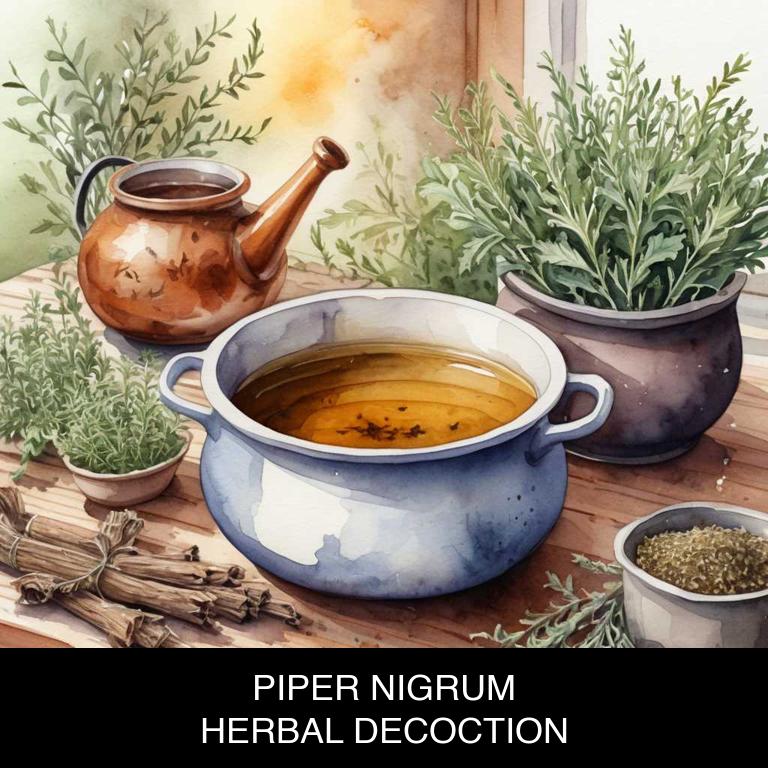
Medicinal Constituents
The list below shows the primary medicinal constituents in Piper nigrum decoctions that help with knee pain.
- Piperine: Piperine, a bioactive alkaloid in Piper nigrum, has anti-inflammatory properties that may help reduce knee pain by inhibiting the production of pro-inflammatory enzymes and mediators.
- Polysaccharides: Polysaccharides in Piper nigrum decoctions may help alleviate knee pain by stimulating the immune system and promoting the production of anti-inflammatory cytokines, which can reduce inflammation and promote healing.
- Flavonoids: Flavonoids present in Piper nigrum decoctions, such as kaempferol and quercetin, possess potent anti-inflammatory and antioxidant properties that may help reduce knee pain by inhibiting the production of pro-inflammatory enzymes and scavenging free radicals.
Parts Used
The list below shows the primary parts of black pepper used to make decoctions for knee pain.
- Seeds: Piper nigrum seeds are used to make decoctions for knee pain due to their analgesic and anti-inflammatory properties.
- Rhyzomes: Piper nigrum rhyzomes are used for knee pain decoctions because of their piperine content, which has anti-inflammatory and pain-relieving effects.
- Leaves: Piper nigrum leaves are used to make decoctions for knee pain due to their ability to reduce inflammation and alleviate pain.
Quick Recipe
The following recipe gives a procedure to make a basic black pepper for knee pain.
- Harvest ripe piper nigrum berries from the plant and clean them thoroughly with cold water.
- Combine 5-7 grams of the cleaned berries with 200 milliliters of water in a saucepan.
- Boil the mixture over medium heat for 5-7 minutes or until the liquid has reduced slightly.
- Strain the decoction through a cheesecloth or fine-mesh sieve into a clean container.
- Store the herbal decoction in an airtight container in the refrigerator for up to 3 days.
What is the best combination of herbal decoctions to use for knee pain?
The best combination of herbal decoctions that help with knee pain is a blend of Willow Bark, Turmeric, and Ginger.
Willow Bark contains salicin, a natural anti-inflammatory that reduces pain and swelling. Turmeric's active compound, Curcumin, has potent anti-inflammatory and antioxidant properties that help in healing damaged tissues. Ginger, with its warming and anti-inflammatory properties, soothes and relaxes the knee joint.
Combining these three decoctions can provide effective relief from knee pain and promote overall joint health.
What ailments similar to knee pain are treated with herbal decoctions?
Ailments similar to knee pain that are treated with herbal decoctions are osteoarthritis, rheumatoid arthritis, and gout.
Herbal decoctions like willow bark, turmeric, and ginger are commonly used to reduce inflammation and alleviate symptoms such as stiffness, swelling, and joint pain.
Other herbs like ashwagandha, devil's claw, and yucca root may also be included in herbal remedies for these conditions.